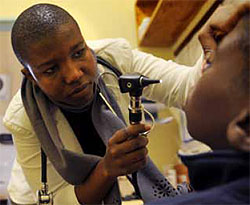Bringing Health Care Services to Rural South Africa
Resource type: Grantee Story

Half of South Africa’s population live in rural areas, but only 12 per cent of doctors practice there. Dr. Lungile Hobe often accompanied her mother, a nurse, to the local hospital in rural Mseleni; these childhood visits inspired her to become a doctor.
Dr. Hobe treats patients in rural communities, often travelling to remote locations where no doctors live or work. “Thirty per cent of our patients are infected with HIV, and I am the main source of health care for my community,” she explained.
Dr. Hobe is part of a group of young professionals committed to improving the health of impoverished rural South Africans overwhelmed by HIV/AIDs and tuberculosis. Among them are more than 116 graduates supported by Atlantic-grantee Umthombo Youth Development Foundation (UYDF, formerly Friends of Mosvold). UYDF identified, recruited, paid university tuition and provided emotional and professional guidance so they could become the primary health care workers their communities need. In 2012, UYDF is supporting 183 students and working with 12 hospitals.
UYDF-supported graduates of medical, nursing and other professional health programmes are now improving health care in rural areas. One graduate brought optometry to his home community for the first time. Another is one of three psychologists helping 55,000 people in a rural district. And yet another, a biomedical technologist, set up a sophisticated lab in a local hospital, which is now providing test results far more quickly than in the past.
Atlantic’s investment in South Africa’s health care work force includes providing ZAR7.8 million ($938,600) over three years to UYDF, which invests an average of ZAR84,700 ($10,192) a year in each student. In exchange, graduates agree to return to their communities to provide care for at least the same period as the UYDF support.
This small organisation, based in KwaZulu-Natal, has made an invaluable contribution by demonstrating what it takes to successfully identify, train and retain young health care professionals committed to helping rural communities. Crucially, 69 per cent of UYDF’s graduates continue to work in rural communities after meeting their obligation. Significantly, the graduation rate for UYDF students pursuing health science degrees is 84 per cent, more than twice the average rate of 35 per cent for all such students in South Africa. This impressive record and Atlantic’s support persuaded ELMA Philanthropies to provide an additional ZAR10.2 million ($1.2 million) to UYDF over four years.
The UYDF model has now been adopted by the KwaZulu-Natal and Eastern Cape governments, and UYDF is sharing what it learned to ensure that more health professionals like Dr. Hobe practice the kind of medicine rural South Africa needs most.
Giving While Living: Marking 30 Years of Achievements: 1982–2012
> Read more stories of impact in our 30th anniversary publication